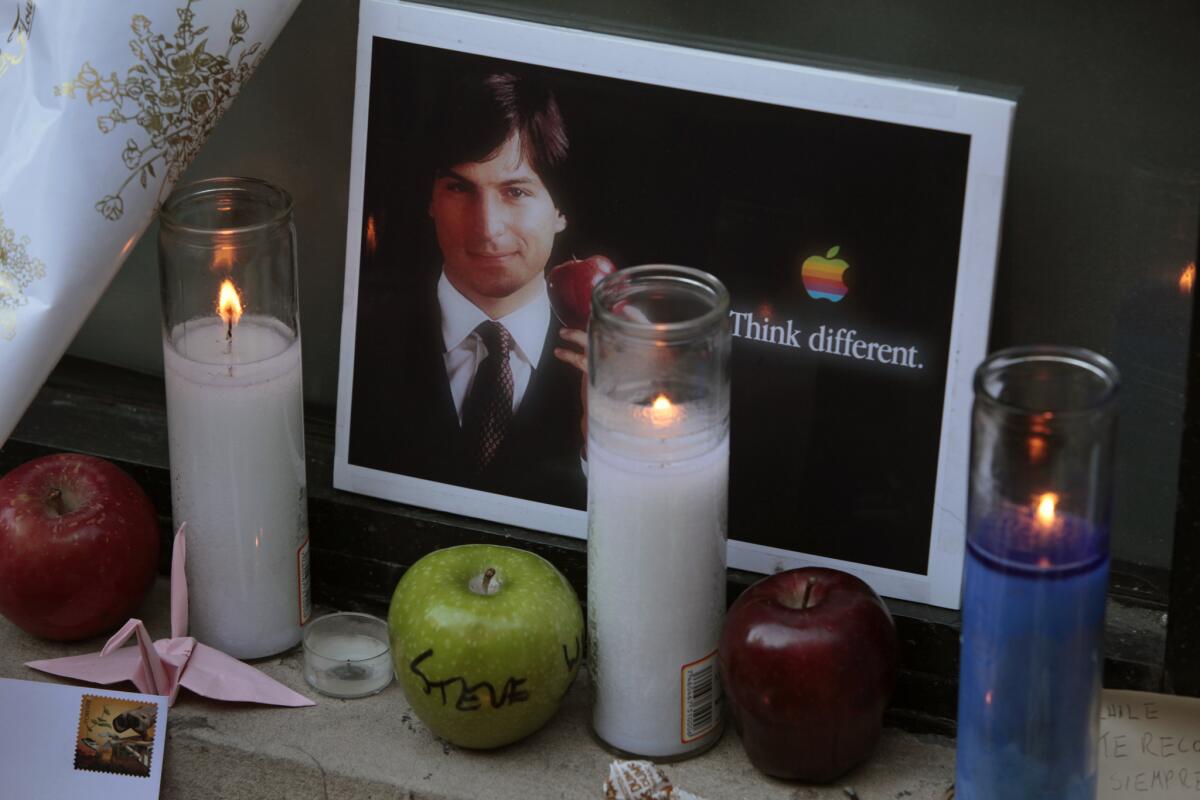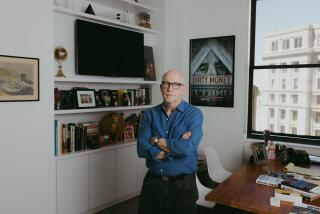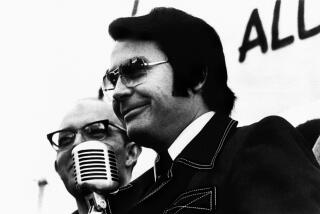SXSW 2015: After Scientology documentary, Alex Gibney aims at Steve Jobs

Reporting from Austin, Texas — Just a few minutes into Alex Gibney’s new documentary about Steve Jobs, it becomes glaringly obvious that the filmmaker may not be the biggest fan of his subject.
After showing numerous Apple users mourning Jobs’ death in 2011, Gibney admits he was initially mystified by the immense outpouring of grief. The loss of the Apple co-founder seemed to be as deeply felt as that of the Rev. Martin Luther King Jr. or John Lennon -- all for a guy who created products we love?
FULL COVERAGE: South by Southwest
Yes, Gibney admits in a voice-over, he too loved his iPhone -- and “WALL-E,” the 2008 film from Pixar, a company Jobs acquired in 1986. But this was also a man with a reputation for being “ruthless, deceitful and cruel behind the scenes,” Gibney notes. So why all the idolatry?
This is the question Gibney seeks to ask in “Steve Jobs: The Man in the Machine,” which premiered here on Saturday. The filmmaker flew to Austin, Texas, for the movie’s unveiling, despite being in the midst of heavy promotion for his Scientology documentary “Going Clear,” which premieres on HBO on March 29. Indeed, the documentarian has been working at a breakneck pace over the last few years, also releasing films about Lance Armstrong and the Catholic Church.
With the Jobs film, Gibney didn’t set out to make a “cradle to grave” biography.
“That would been a stone-skipping exercise,” he said in a Q&A following the film.
Indeed, there’s already been plenty published about the legendary tech pioneer, including Walter Isaacson’s extensive 2011 authorized biography. Gibney said he did speak with Isaacson briefly, but ultimately decided to take a “very different approach” toward Jobs than the author did.
Certainly Gibney’s portrayal of Jobs is far less flattering than Isaacson’s. As the film makes its way through Jobs’ story chronologically, Gibney highlights moments in which Jobs was unkind. The documentary says that when he and Apple co-founder Steve Wozniak worked at Atari, Jobs once gave Wozniak only $350 of a $7,000 check meant to be split between them.
The film suggests he may have been downright greedy. The Chinese workers who were putting together iPhone 4s were making $12 per unit, while the company was profiting $300 per phone.
And then there’s Jobs’ former girlfriend, Chrisann Brennan, who recalls in the documentary how when she told him she was pregnant with his child, his “jaw clenched in searing anger” before he ran out the door, “kinda like a teenager.”
Brennan goes on in the film to recount a well-known story of how Jobs initially denied paternity of their daughter, Lisa, at first giving her $500 in monthly child support even as he was pocketing millions.
“He went into magnificence and enlightenment,” Brennan says, “but he blew it.”
It’s not that Gibney doesn’t want to see the good in Jobs. In fact, the director initally appeared to try to sympathize with him, traveling to the Zen temples in Japan that Jobs frequented to try to understand his spiritual values. The footage from these remote, serene locations is gorgeous -- and that aesthetic beauty was really all Jobs took from his trips there, Gibney concluded.
“Zen was superficial -- a formal elegance,” Gibney said following the screening. “He believed in making the world a better place by making better products, and that’s it.”
Follow @AmyKinLA for more news from SXSW
We’re at South by Southwest until March 22. Join us at latimes.com/sxsw for ongoing coverage of the festival.
More to Read
Only good movies
Get the Indie Focus newsletter, Mark Olsen's weekly guide to the world of cinema.
You may occasionally receive promotional content from the Los Angeles Times.









